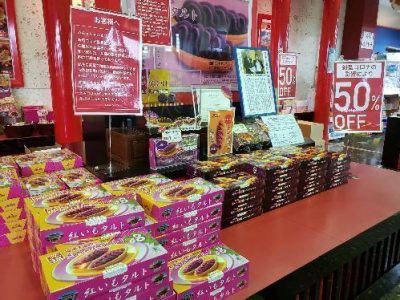Large amounts of omiyage in danger of being discarded due to decrease in tourism, and sellers are sending out an SOS “We need Okinawan’s to eat these, now more than ever.”

Omiyage piled high and at a steep discount, unable to be sold due to the sharp decline in tourism. April 23, at the Okashigoten main store in Yomitan.
April 26, 2020 Ryukyu Shimpo
By Eriko Tamaki
The effects of the continued COVID-19 pandemic have rippled out to effect Okinawan-produced goods. Since almost all omiyage stores and other tourist facilities are currently closed for business, there has been a steep decline in sales of souvenirs for tourists, manufacturers have raised the alarm, reporting that, “sales in April were only 10% of what they were the previous year.” In particular danger are food items, which have an shelf life and are now at risk of large amounts of stock being disposed. The key to solving this problem is of course local consumers. A representative from one maker sent out an SOS, saying “We need Okinawans to eat these, now more than ever.”
“50% off because of coronavirus.” At Okashigoten (Yomitan Village), makers of the Okinawan staple the “Original purple yam tart,” the stock of sweets, which has been collected from each of their stores, is piled high on a table like a mountain. While the company has 11 shops in Okinawa, only their flagship store is currently operating. Their production line has also stopped, with no plan to re-open anytime soon.
Their primary product, the purple yam tart, has a shelf life of one month. Their chinsuko (an Okinawan biscuit) also has a shelf life of around three months. With the sharp decline in tourism in addition to the restrictions placed around the tomb-sweeping festival, April sales dropped to around 10% of what they were the previous year. Since they need to sell off their stock before the goods need to be disposed of, since April 17 they have been selling everything with a major discount.
Company president Hideki Takushi said with a grave expression, “After taking into consideration labor costs, there is almost not profit to be had. There is nothing else we can do other than throwing them away.”
Companies without their own store fronts are in an even worse situation. Asahi, a company that produces jimami tofu and Rafute (a braised pork dish), has seen a considerable amount of items returned from omiyage stores that are closed for business. Executive director Yoji Akamine said in bewilderment, “With omiyage stores and other tourist facilities closed, there is no place to sell. Even though we are looking for new avenues for selling, most business have transitioned to telework, making negotiations difficult.
This has not affected only the omiyage makers, but also companies such as those who produce ingredients and wrapping paper printers.
Genichi Matsumoto, president of Okinawa Tourism and Omiyage Fairness Committee said, “Until the tourists return, businesses are hoping to protect employment and not lose production capacity. To achieve this, we need Okinawans to buy Okinawan goods.”
(English translation by T&CT and Sam Grieb)
Previous Article:Mystical, endangered orchid blooms in Nago City
Next Article:On 68th anniversary of San Francisco Treaty, Governor Denny Tamaki calls for dialogue between Japan and U.S., reduction of base burden
[Similar Articles]
- OkiHam to test-market malted vinegar in Taiwan
- Kin business group publishes booklet to promote Taimo sweets
- JTB to strengthen Okinawa tourism via training of 300 employees in Okinawa
- “Who can we tell about our troubles?” Souvenir stores cry for help on a deserted Kokusai-dori
- The disappearance of foreigners from the streets due to coronavirus continues to assail Okinawa’s economy, with travel agency sales – which rely heavily on Chinese patronage – dropping to almost “zero”
 Webcam(Kokusai Street)
Webcam(Kokusai Street)


